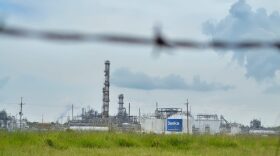-
The Trump administration cancelled a program to fund projects that help prevent storm damage before disasters. Louisiana was set to receive more than $720 million.
-
Gov. Landry says residents should wait to clean property until toxicity tests are complete.
-
Residents cite pollution, loss of fishing and diminished tax revenue as liquefied natural gas production accelerates here, feeding demand from Europe and Asia.
-
“This will set the road for what Louisiana looks like in terms of these data center expansions for the next years to come.”
-
The governor could win a legal fight to keep money already allocated to Louisiana, attorney says.
-
Coca-Cola said they plan to release a line of their signature beverage sweetened with sugarcane in the U.S. this fall.
-
The Trump administration is canceling plans to use large areas of federal waters for new offshore wind development.
-
U.S. Senator Bill Cassidy (R-Baton Rouge) is urging members of Congress to address the exorbitant costs of flood insurance.
-
WWNO/WRKF learned of Carubba's dismissal on Tuesday after reporter Eva Tesfaye showed up to his office for an interview.
-
With light bills at times rivaling the cost of a house note, those with low incomes struggle to keep their homes at a safe and comfortable temperature.
-
Inshore shrimp season in Louisiana will open a couple weeks later than usual this year, and shrimpers are all for it.
-
After a proclamation from President Donald Trump, two facilities located in LaPlace, Louisiana will be allowed to ignore federal regulations meant to curb harmful pollutants.

















